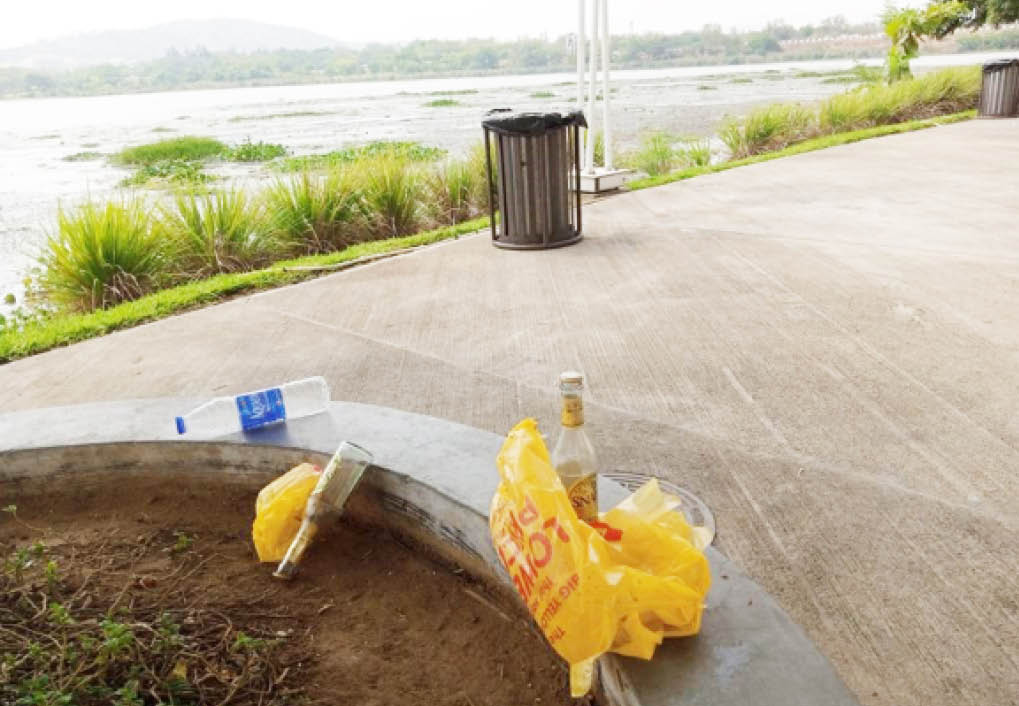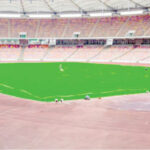Battling the menace of plastic waste pollution has become a global environmental challenge but particularly for Nigeria, the menace is assuming a monstrous magnitude, such that even in protected areas, plastics are littered everywhere.
The case of Jabi Lake, Abuja’s manmade water body huddling between Jabi and Kado Districts, which is polluted by plastic and polythene waste highlights the extent of the problem.
- Foundation cleans Jabi Lake, seeks protection of environment
- UK firm builds solar power plant at Jabi Lake Mall
When our reporter visited the lake, it was discovered that picnickers littered wastes in the water, mostly plastic and polythene.
Water hyacinth also flourished on the surface of the lake, making it an eyesore.
Jabi Lake with a surface area of 1,300 hectares (3,200) acres is an earth dam that was initially created to provide water to the residents of Abuja.
The initial capacity of the reservoir was to supply water to 100,000 residents. But after the construction of the bigger Lower Usuma Dam, the reservoir became a fishing and tourism attraction.
A resident found in the vicinity of the lake, Godstime James, when asked why fun seekers dispose of wastes inside the lake, said: “From my own perspective, some people who come around usually during the weekends are the ones littering the lake with wastes. I have seen instances where people throw some things to see if there are living things inside the water that may likely come out to feed on what has been thrown inside the water.
“You know we have different kinds of people with different characters. Some come close to the lake to snap pictures and in the process, things they are holding, end up falling inside the water and they just let go of it; thereby causing unwanted objects to litter the surface of the water, while some intentionally thrash objects inside.”
He said the security at the Jabi Lake Mall, Abuja’s popular shopping centre, often tries to stop people from littering the lake but some arrogant residents always ignore them (security).

Photo: Dalhatu Liman
“You can see that the lake is very dirty now because of the level of the trash that you can see now. And you can see that the waste is clogged at the extreme end of the water, making the water stagnant. That is why you can see the lake looking dirty,” he added.
Research has proven that plastic pollution is quite hazardous because it affects land and water bodies through its non-biodegradable properties.
It is known to emit toxic gasses when exposed or heated up.
Plastic wastes are also harmful to human health as they contain harmful acids, which may lead to death.
Every year, an estimated 42 million tonnes of solid waste is generated in Nigeria, with less than 12 per cent being recycled; so 65 per cent of this recyclable waste ends up in water bodies and at dumpsites, contributing to about 20 per cent of Green House Gases (GHG) such as carbon dioxide (CO2), methane (CH4), sulphur and nitrogen gases being emitted into the environment.
Though plastic waste recycling has huge potential for revenue generation, employment and engendering a sustainable environment, the potential is yet to be tapped in Nigeria.
Last year, the Society for Planet and Prosperity (SPP), a non-governmental organisation (NGO), began a cleanup at the Jabi Lake but it appears the exercise has not been sustained.
Mr Oghenemere Orugbo, Executive Director of the organisation who supervised the exercise, said that the aim was to create awareness on the dangers of living in a filthy environment.
Orugbo said that the operation was determined to rid the environment of heaps of refuse.
He said the organisation wanted to ensure that people living in the area were free from contracting diseases.
“The Jabi Lake cleanup, which became imperative is occasioned by the unacceptable amount of waste, mostly plastic waste carelessly dumped into the lake.
“The wastes are dropped by fun seekers and residents around the only lake situated within Abuja metropolis.
“The cleanup is basically the physical removal of plastic and other waste materials collected in cellophane bags and for proper disposal.
“Participants were drawn from a pool of volunteers, members and trustees of the organisation, as well as our well-wishers,’’ Orugbo had said.
The spokesperson for the Abuja Environmental Protection Board (AEPB), Mrs Janet Peni, said that though Jabi Lake is under the purview of the Parks and Recreation Department of the FCTA, occasionally, the AEPB intervenes by clearing the wastes.

 Join Daily Trust WhatsApp Community For Quick Access To News and Happenings Around You.
Join Daily Trust WhatsApp Community For Quick Access To News and Happenings Around You.

